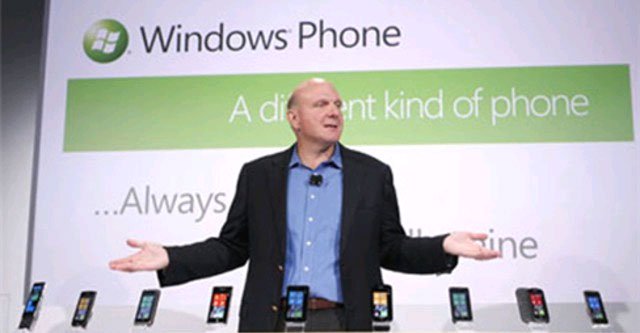Windows Phone is backing to 'death door'
Market share slowed to below 3%, while Microsoft focused on the low-end segment that could make Windows Phone situation worse.

Former CEO Steve Ballmer of Microsoft introduced the first series of smartphones running Windows Phone at the launch of Windows Phone 7 in New York (USA) on October 11, 2010. After 4 years, all initial expectations with Windows Phone seem to be turned off.
After BlackBerry's market share fell within just a few years, Microsoft's Windows Phone began to bring new expectations for those who didn't want to see Google and Apple split the mobile world with two Android and iOS platforms. . The market share of Windows Phone increased rapidly in 2013, and reached a peak of 3.4% in the fourth quarter of 2013, up from 2.1% a year earlier.
Initial achievements over the years 2011 - 2013, although still small, but the upward trend of Windows Phone has brought confidence to analysts about a smartphone market that will form a cauldron with three Android - iOS platforms. - Windows Phone.
However, Windows Phone's market share in the second half of this year has not only increased rapidly as previously expected but also declined, currently only 2.8%, according to the latest IDC data.
In fact, the first three versions of Windows Phone (including 7.0, 7.5 and 8.0) are far behind iOS and Android, but the latest version of Windows Phone 8.1, released last summer, shows that Microsoft has made an effort. Great for its mobile platform to be more complete with many outstanding new features, enough to compete with rival platforms.
However, after 4 years tired of witnessing Windows Phone scratching on the smartphone market, users seem no longer impressed with the launch of Windows Phone 8.1. Now perhaps users only rely on Windows 10, will launch next year as promised by Microsoft.
Currently, Windows Phone's market share is shrinking, despite Microsoft's efforts, such as a "no-go" Windows Phone move for manufacturers to install devices with screens smaller than 9 inches.
But the problems of Windows Phone are not merely the current situation of this mobile operating system. In a new 30-page report recently published by market researcher Jackdaw Research, analyst Jan Dawson of the company said Microsoft's mobile platform is unlikely to recover.
Windows Phone is 'entangled' in a vicious cycle. The market share is too small to appeal to developers to create applications for this platform. Lack of application users will be indifferent, and in turn, device manufacturers cannot risk a platform that is less user-interested. Ecosystems will therefore be difficult to develop.
Jackdaw Research reports that Windows Phone has few proprietary applications, applications are updated slowly. As soon as Microsoft also gives priority to providing applications for rival platforms first.
Meanwhile the ecosystem of iOS and Android has been developing strongly. With iOS, after launching the first version, Apple quickly launched highly rated applications such as iWork, iMovie, and iPhoto software to showcase the power of the new platform, conquering both consumers. use and developers. A few years later, Apple raised the security level to the enterprise level for iOS, so that the iPhone and iPad soon became the new standard for mobile businesses.
Google is not in the direction of providing 'killer' applications and high security, but the Android open source free licensing strategy has created the exciting race of device manufacturers, offering many options for people. used, and the blue robot army quickly dominates the market.
According to IDC's latest data, Android and iOS smartphones will account for more than 96% market share in the global smartphone market in 2014, of which Android's market share is 82.3% and iOS is 13.8%. .
Very few opportunities for Windows Phone, Dawson said in the report mentioned above. In fact, the application for Windows Phone platform is currently far less than Android and iOS in both quantity and quality. While market share is too small, Microsoft focuses on the low-end segment, so it's hard to say Windows Phone will appeal to developers creating applications for this platform.
It is worth noting that smartphone users in the low-cost segment spend very little on the application. Therefore, Microsoft's move has pushed consumers 'to spend' on iOS, and developers will follow them to make money. Windows Phone is difficult to develop applications will be even more difficult.
As for Microsoft, the company has provided Office for iOS versions, and is about to be available for Android, while there is no Office version available for its Windows Phone platform. This makes customers who stick with Microsoft no longer have the real motivation to use Windows Phone.
Office is no longer an advantage for the Windows Phone platform as it once was with Windows on a PC.
The truth is that the world doesn't need Windows Phone. Small market share of less than 3% after 4 years of development has said it all. Microsoft needs to find a way to make consumers want devices that run Windows Phone, and in order to achieve that, the company must stimulate developers to create applications for their platform.
Now people buy equipment not simply because it runs Windows. And it is worrisome for Microsoft that no one will make money from Windows Phone, according to Huawei's International Communications Director Joe Kelly speaking on The Seattle Times .